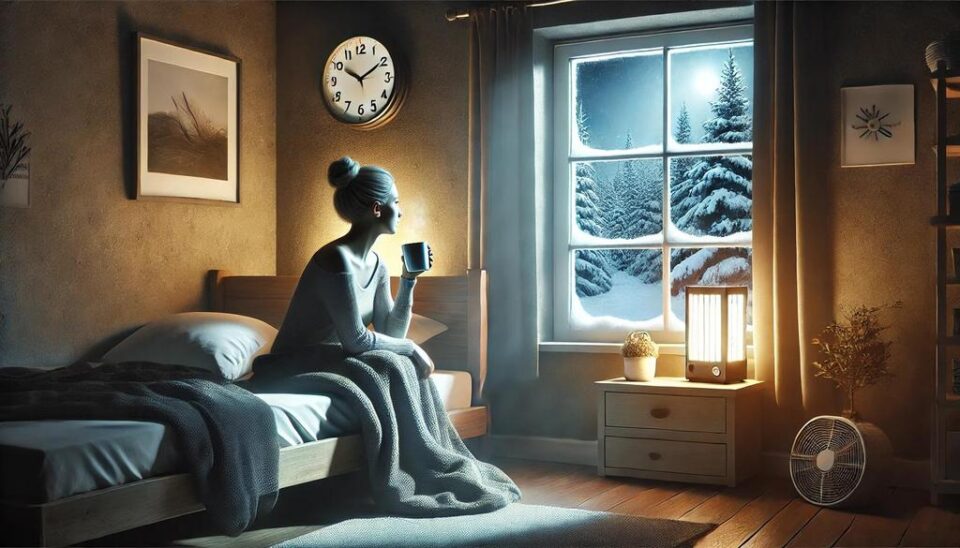As the days grow shorter and the temperature begins to drop, the winter season can significantly impact your sleep. The lack of sunlight, coupled with colder temperatures, can disrupt your body’s natural wake-sleep cycle, leading to potential sleep disturbances. Less daylight hours can disrupt your circadian rhythm, thereby complicating the maintenance of a consistent sleep schedule. Many people also experience changes in their energy levels, mood, and overall sleep quality during this time. Understanding the changes that occur during winter and taking steps to adjust your sleep routine can make a significant difference in ensuring you get the rest you need.
The Impact of Shorter Days and Less Sunlight
One of the primary ways that winter affects sleep is through a reduction in daylight. With the sun setting earlier and rising later, your body’s internal clock, also known as the circadian rhythm, may become misaligned. The circadian rhythm is responsible for regulating your sleep-wake cycle, and it relies on sunlight to help synchronize your sleep patterns. The shorter days of winter mean that there is less natural light exposure, which can cause you to feel more worn out earlier in the evening and make it harder to wake up in the morning.
During the winter months, many people experience a dip in mood and energy levels. This is partly due to the lack of sunlight, which plays a crucial role in regulating serotonin and melatonin levels. Serotonin is a neurotransmitter that helps regulate mood, while melatonin is a hormone that signals to your body that it’s time to sleep. Without adequate sunlight, serotonin levels can drop, leading to feelings of sadness or fatigue. Disruption in melatonin production can also lead to sleep disturbances like insomnia or waking up in the middle of the night.
The Influence of Cold Temperatures on Sleep Quality
Cold temperatures can also affect the quality of your sleep. When the weather turns colder, many people tend to bundle up in thick blankets, sweaters, or pajamas, which might seem comfortable at first. However, being overly warm or too cold during sleep can interfere with your ability to enter deep, restorative sleep. The ideal temperature for sleep typically ranges between 60 and 67 degrees Fahrenheit (15-20°C). If your room is too cold or too warm, your body may struggle to regulate its internal temperature, which can lead to disruptions in your sleep cycle.
The winter months can also contribute to certain sleep disorders, such as sleep apnea. The change in air quality, with colder and drier air, can lead to nasal congestion or a dry throat, exacerbating breathing problems during sleep. This can lead to restless nights and decreased overall sleep quality, leaving you feeling fatigued and less refreshed in the morning.

Adjusting Your Sleep Cycle for Winter
Despite these challenges, there are several ways to adapt your sleep routine to the changing season. Making small adjustments to your environment and habits can help mitigate the negative effects of shorter days and colder temperatures, ensuring that you maintain a healthy sleep cycle throughout the winter.
Maintain a Consistent Sleep Schedule
During the winter months, it’s especially important to stick to a regular sleep schedule. Keep your bedtime and waketime consistent, even on weekends. This will help regulate your circadian rhythm and improve the consistency of your sleep. It’s tempting to sleep in on weekends, but it can mess with your internal clock and make weekday asleep and wake up harder.
Maximize Natural Light Exposure
Winter’s limited daylight hours necessitate maximizing the available natural light. Spend time outdoors during the day, especially in the morning, to expose yourself to sunlight. Even a short walk outside can help reset your circadian rhythm and boost your serotonin levels. If natural light is scarce in your area, consider using a light therapy box. These devices mimic natural sunlight and can help regulate your sleep-wake cycle, improving mood and energy levels during the darker months.

Create a Cozy Sleep Environment
During the winter, your bedroom environment plays a crucial role in your ability to sleep well. Make sure your room is at an optimal temperature for sleep, ideally between 60 and 67 degrees Fahrenheit. If you find that your room is too cold, consider using a space heater, but avoid making the room too warm, as this can lead to restless sleep. Layer your bedding with comfortable sheets and blankets that can help keep you warm without causing overheating.
Adding humidity to the air with a humidifier can also help combat the dry air of winter, which can cause discomfort in your throat and nasal passages. This can be particularly beneficial if you experience breathing difficulties or congestion at night.
Be Mindful of Diet and Exercise
What you eat and how active you are during the day can have a significant impact on your sleep quality. In winter, it’s common for people to indulge in heavier, comfort foods that may affect sleep. Try to avoid large meals, caffeine, and alcohol close to bedtime, as these can interfere with your ability to fall asleep. Eating a light, balanced dinner a few hours before bed can promote better sleep.
Regular exercise is also important for adequate sleep. Physical activity can help regulate your sleep patterns, reduce stress, and improve mood. However, avoid exercising too close to bedtime, as it can make it harder for your body to wind down. Aim to complete exercise at least a few hours before going to bed to allow your body time to cool down.
Manage Stress and Anxiety
Winter can bring about feelings of stress and anxiety, especially with the holidays or changes in routine. This can interfere with your ability to relax and fall asleep. Finding ways to manage stress, such as through mindfulness meditation, deep breathing exercises, or yoga, can help calm your mind and prepare you for restful sleep. Creating a bedtime routine that includes calming activities, such as reading or listening to soothing music, can signal to your brain that it’s time to wind down.

Maintaining Sleep Health Year-Round
Adjusting your sleep habits for winter is crucial to ensuring that you maintain good sleep hygiene year-round. If you continue to experience sleep disruptions despite making these changes, it may be time to consult with a sleep specialist. Searching for a sleep doctor near me can help assess your situation and provide personalized advice and treatment options to improve your sleep quality. By taking proactive steps to manage your sleep environment, routine, and lifestyle, you can enjoy better sleep during the winter months and beyond.
Winter brings with it a shift in both the environment and our daily routines. By understanding the effects of shorter days, less sunlight, and colder temperatures on your sleep and making simple adjustments, you can maintain a healthy sleep cycle even during the darkest months. Prioritizing excellent sleep hygiene and adapting your environment can help you feel rested, rejuvenated, and ready to face the challenges of winter with more energy and clarity.
If you’re struggling with sleep disruptions this winter, don’t hesitate to reach out to a sleep expert who can provide tailored advice and solutions for your unique needs. Searching TMJ therapy near me can also result in local doctors in your area who can guide you for maintaining healthy sleep year round.




